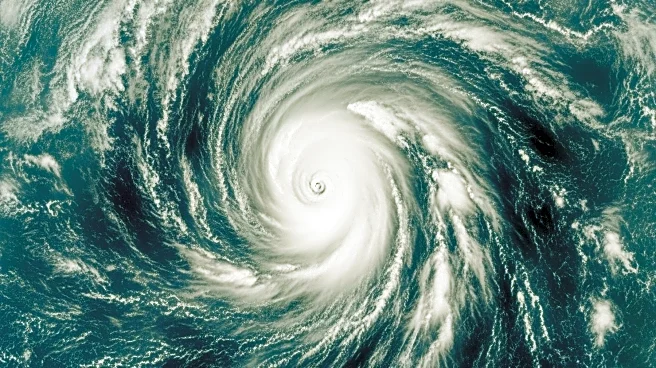What's Happening?
Hurricane Melissa recently struck Jamaica as a Category 5 storm, causing significant destruction with winds exceeding 185 mph and widespread flooding. The European Space Agency's Copernicus Sentinel-3
satellite captured images of the storm, highlighting the temperature differences that fuel such powerful hurricanes. Scientists are using this data to understand how human-driven global warming is intensifying hurricanes by increasing ocean temperatures. The Copernicus program, run by the European Union, employs Sentinel satellites to monitor coastal changes and ocean temperatures, providing crucial insights into the formation and growth of hurricanes like Melissa.
Why It's Important?
The data collected by the Copernicus Sentinel-3 satellite is vital for understanding the increasing intensity of hurricanes due to climate change. As ocean temperatures rise, hurricanes draw more energy, becoming more destructive. This information is crucial for forecasting and preparedness, helping mitigate the impact of such storms on affected regions. The insights gained from satellite imagery can inform climate policy and adaptation strategies, emphasizing the need for urgent climate action to address the root causes of global warming and its effects on extreme weather events.
What's Next?
Continued monitoring and analysis of hurricanes using satellite technology will enhance forecasting capabilities and preparedness measures. The data can inform international climate discussions and policies aimed at reducing greenhouse gas emissions and mitigating climate change impacts. Collaboration between scientific communities and policymakers is essential to develop effective strategies for climate resilience and adaptation, particularly in regions vulnerable to extreme weather events.
Beyond the Headlines
The use of satellite technology to study hurricanes underscores the importance of international cooperation in addressing climate change. The Copernicus program exemplifies how shared resources and data can lead to a better understanding of global environmental challenges. This approach highlights the ethical responsibility of developed nations to support climate resilience efforts in vulnerable regions, fostering global solidarity in the fight against climate change.









